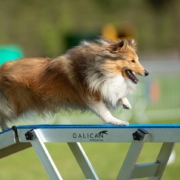The Importance of Consistency in Dog Obedience Training
Today, we’re going to talk about the importance of consistency in dog obedience training.
Whether you’re a new dog owner or an experienced one, consistency plays a crucial role in helping your four-legged friend become a well-behaved member of the family.
In this guide, we’ll explore why consistency with dog training is essential, how it benefits both you as a dog owner and your dog, and share helpful tips to make your obedience dog training journey more enjoyable and successful.
Because we want all our dogs to be successful with obedience training!
| Key Takeaways |
|---|
| Understanding the Canine Mind: Dogs learn through repetition and association, making consistency crucial for effective training. |
| Building Trust and Confidence: Consistency fosters trust between you and your dog, leading to a more secure and confident canine companion. |
| Consistency for Both Dog and Owner: Training requires consistency from both the dog and the owner, improving communication and understanding between them. |
| The Role of Consistency in a Dog’s Life: Dogs thrive on routine and predictability, making consistent training essential for their well-being. |
| Inconsistency’s Impact: Inconsistent training can lead to confusion, anxiety, and behavior issues in your dog. |
| The Three P’s of Dog Training: Patience, Persistence, and Praise are essential components of successful dog training. |
| The Four Stages of Learning: Acquisition, Fluency, Generalization, and Maintenance are critical for long-term success in dog training. |
| Training Schedule: Establish a regular training schedule with short, frequent sessions to help maintain consistency. |
| Consistent Cues and Commands: Choose specific words or gestures for each command and use them consistently to avoid confusion. |
| Family Involvement: Ensure all family members are on the same page with training techniques and commands for better results. |
| Addressing Setbacks: Stay patient and persistent when faced with setbacks in the training process, and continue practicing to overcome obstacles. |
Why Is Consistency Important in Dog Training?
To appreciate why consistency with obedience dog training really matters for success, we can break this down into three really easy sections. These are:
Understanding the Canine Mind
Dogs are incredibly intelligent creatures, but they don’t think the same way we do.
They learn through repetition and association.
By being consistent with our training methods, we help our dogs understand what we expect from them more quickly and easily (and also we, as dog trainers/dog handlers learn faster too!).
Building Trust and Confidence
Consistency helps build trust between you and your dog.
When your dog knows what to expect from you, they will feel more secure and confident. This trust will also make your dog more eager to learn and follow your commands and give you the desired behavior.
Establishing Clear Expectations for Both the Dog and Owner
And finally, consistency is essential not only for your dog but also for you, the owner.
Dog training is, in many ways, also human training. By being consistent, you’re teaching yourself to become a better dog owner and trainer. You’ll learn to recognize your dog’s signals, understand their needs, and provide the guidance they need to thrive.
Do Dogs Need Consistency?
Yes, absolutely! And it’s a lot more important than some realise.
The Role of Consistency in a Dog’s Life
Dogs thrive on routine and predictability. A consistent training approach helps your dog understand their role in the family and makes it easier for them to navigate their environment.
How Inconsistency Affects Your Dog’s Behavior
Inconsistent training can lead to confusion, anxiety, and even undesirable behavior issues in your dog. When your dog doesn’t know what to expect, they might resort to unwanted behaviors such as excessive barking, chewing, or even aggression. Behavior modification is do-able, but it takes time, hence why we need consistency in dog obedience training.
Benefits of Consistent Dog Training
A consistent training approach helps your dog become a well-behaved, confident, and happy companion. They’ll be more likely to follow your commands and less likely to develop behavioral problems.

The Three P’s of Dog Training
These guiding three simple principles are your trusty roadmap to successful obedience training, and they’ll make the process not only more effective but also more enjoyable for both you and your dog.
Patience: Taking the Time to Train Your Dog Effectively
Patience is key when training your dog.
Remember, they’re learning a new skill, and it takes time to master it. Be patient and give your dog the time they need to understand your expectations.
Persistence: Staying Committed to the Training Process
Persistence is essential for successful dog training.
Stick with it, even when it’s challenging. Remember that progress may be slow, but with persistence, you’ll see improvement over time.
Praise: Reinforcing Positive Behavior with Rewards and Affection
Praise your dog when they get it right!
Positive reinforcement, like treats, praise, or a favorite toy, will help your dog learn faster and enjoy the training process.
We will discuss a few other key attributes when it comes to obedience dog training
The Four Stages of Learning in Dog Training
We’re doing our best to keep everything as simple as possible for you. So when it comes to training your dog, there are four stages to this process. These are:
Acquisition: Introducing New Behaviors
During the acquisition stage, you’ll introduce your dog to new commands or behaviors.
Use clear, consistent cues and positive reinforcement to help your dog understand what you’re asking of them.
Fluency: Developing Proficiency in Learned Behaviors
Once your dog understands the new behavior, it’s time to practice.
Repeated practice will help your dog become more fluent and confident in performing the desired behavior.
Generalization: Applying Learned Behaviors to Various Contexts
In the generalization stage, your dog learns to apply their new skills
in different situations and environments. Practice the learned behaviors in various settings, around new people, and with different distractions to help your dog become more adaptable.
Maintenance: Ensuring Long-term Success Through Consistent Practice
To keep your dog’s skills sharp, continue practicing and reinforcing learned behaviors regularly. Consistent practice will ensure your dog remembers their training and maintains good behavior over time.
There are other factors too, such as mastering patience and timing discussed here on this site.
Tips for Maintaining Consistency in Dog Training
Create a Training Schedule
Establish a regular training schedule to help both you and your dog stay on track. Aim for short, frequent sessions that fit your lifestyle.
Use Consistent Cues and Commands
Choose specific words or gestures for each command and stick to them. Consistent cues make it easier for your dog to understand what you’re asking.
Involve All Family Members in Training
Everyone in the household should be on the same page with training techniques and commands.
Consistency across family members will help your dog learn faster and prevent confusion.
Address Setbacks with Patience and Perseverance
Setbacks are a natural part of the dog obedience training process.
Stay patient, and don’t be too hard on yourself or your dog. Keep things “fun” for both of you and keep practicing, and you’ll overcome any obstacles together.
And Finally…
We have mentioned the word “Consistency” here a lot, and rightly so. It is one of the key fundamentals to dog training and is a crucial aspect of dog obedience training that benefits both you and your four-legged friend.
By understanding the importance of consistency in dog obedience training and applying the tips and techniques discussed in this blog post, you’ll be well on your way to raising a well-behaved, confident, and happy dog.
Remember to be patient, persistent, and always celebrate your dog’s successes.
Happy training!

